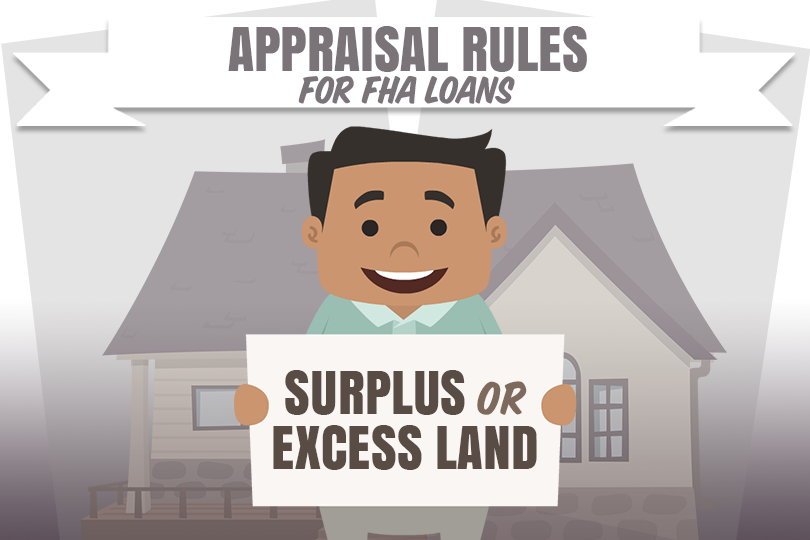FHA Loans, Appraisals, and Excess Land
May 3, 2023
FHA loan rules in HUD 4000.1 discuss appraisal issues related to surplus land or excess land--how does this issue affect the valuation of the home?
The Definition of Surplus or Excess Land
The definition of and rules for surplus/excess land can be found in HUD 4000.1, which says, "Excess Land refers to land that is not needed to serve or support the existing improvement. The highest and best use of the Excess Land may or may not be the same as the highest and best use of the improved parcel. Excess Land may have the potential to be sold separately."
The terms "excess" and "surplus" are NOT interchangeable. Surplus land is described in HUD 4000.1 as, “...land that is not currently needed to support the existing improvement but cannot be separated from the Property and sold off."
Furthermore, surplus Land does not have an independent “highest and best” use. It may or may not “contribute to the value of the improved parcels" according to HUD 4000.1.
FHA Appraisal Guidelines for Surplus/Excess Land
The FHA loan rules for surplus/excess land include a requirement that the FHA appraiser includes the “highest and best” use of the property, “...to support the Appraiser’s conclusion of the existence of Excess Land. The Appraiser must include Surplus Land in the valuation."
FHA loan rules and that in cases where there are “two or more legally conforming platted lots under one legal description and ownership”, and the second vacant lot can be divided /developed “as a separate parcel where such a division will not result in a non-conformity in zoning regulations for the remaining improved lot, the second vacant lot is Excess Land."
The value of the second lot would be excluded from the “final value conclusion of the appraisal”. The appraiser must value the principal site and improvements, “under a hypothetical condition".
There may also be state law and/or lender standards that factor into these procedures. Remember that FHA loan rules are not the only guidelines that will inform the lender’s choices in certain areas. Lender standards and state law will also play an important role.
There are many situations where surplus or excess land might be a factor. If you are not sure how much land is considered “excess” or “surplus”, ask a lender what is typical for the local area and what is considered outside the norm. Your experience may vary; it’s not safe to assume that what is considered “surplus” in one housing market might be considered more typical in another.
------------------------------
RELATED VIDEOS:
What Is an FHA Loan?
Using an FHA Loan Calculator
Meeting FHA Loan Guidelines Improves Your Chances

FHA Loan Articles
August 3, 2023FHA loans are primarily designed to help individuals and families purchase homes for use as their primary residences. Rules for these loans generally discourage their use for investment properties or rentals. However, there are exceptions that come with strict rules.
July 29, 2023One crucial aspect of FHA loans that borrowers need to understand thoroughly is debt ratios. In this article, we look at how they can impact your ability to secure financing for your dream home. Debt ratios help lenders understand a borrower's creditworthiness and any risks associated with the loan.
July 21, 2023Investing in a multi-unit property can be an excellent way to build wealth through rental income and property appreciation. FHA multi-unit property loans make this opportunity more accessible to a broader range of individuals. You must occupy a unit as your primary residence within 60 days of closing the loan.
July 15, 2023To qualify for an FHA loan, you must meet certain employment requirements. In this article, we'll dig into the FHA loan employment requirements so that you can understand what's needed to get approved for this type of mortgage.
July 7, 2023Manufactured homes, sometimes referred to as mobile or modular homes, are factory-built residences designed to meet or exceed national building codes set HUD. They offer cost savings and energy efficiency, making them an attractive housing option for many Americans.







